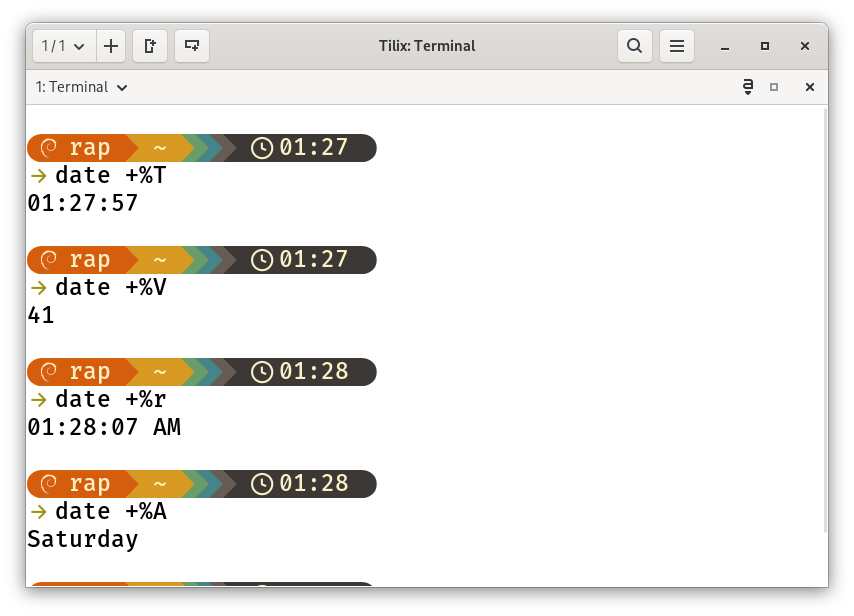%% | a literal % |
%a | locale’s abbreviated weekday name (e.g., Sun) |
%A | locale’s full weekday name (e.g., Sunday) |
%b | locale’s abbreviated month name (e.g., Jan) |
%B | locale’s full month name (e.g., January) |
%c | locale’s date and time (e.g., Thu Mar 3 23:05:25 2005) |
%C | century; like %Y, except omit last two digits (e.g., 21) |
%d | day of month (e.g, 01) |
%D | date; same as %m/%d/%y |
%e | day of month, space padded; same as %_d |
%F | full date; same as %Y-%m-%d |
%g | last two digits of year of ISO week number (see %G) |
%G | year of ISO week number (see %V); normally useful only with %V |
%h | same as %b |
%H | hour (00..23) |
%I | hour (01..12) |
%j | day of year (001..366) |
%k | hour ( 0..23) |
%l | hour ( 1..12) |
%m | month (01..12) |
%M | minute (00..59) |
%n | a newline |
%N | nanoseconds (000000000..999999999) |
%p | locale’s equivalent of either AM or PM; blank if not known |
%P | like %p, but lower case |
%r | locale’s 12-hour clock time (e.g., 11:11:04 PM) |
%R | 24-hour hour and minute; same as %H:%M |
%s | seconds since 1970-01-01 00:00:00 UTC |
%S | second (00..60) |
%t | a tab |
%T | time; same as %H:%M:%S |
%u | day of week (1..7); 1 is Monday |
%U | week number of year, with Sunday as first day of week (00..53) |
%V | ISO week number, with Monday as first day of week (01..53) |
%w | day of week (0..6); 0 is Sunday |
%W | week number of year, with Monday as first day of week (00..53) |
%x | locale’s date representation (e.g., 12/31/99) |
%X | locale’s time representation (e.g., 23:13:48) |
%y | last two digits of year (00..99) |
%Y | year |
%z | +hhmm numeric timezone (e.g., -0400) |
%:z | +hh:mm numeric timezone (e.g., -04:00) |
%::z | +hh:mm:ss numeric time zone (e.g., -04:00:00) |
%:::z | numeric time zone with : to necessary precision (e.g., -04, +05:30) |
%Z | alphabetic time zone abbreviation (e.g., EDT) |
